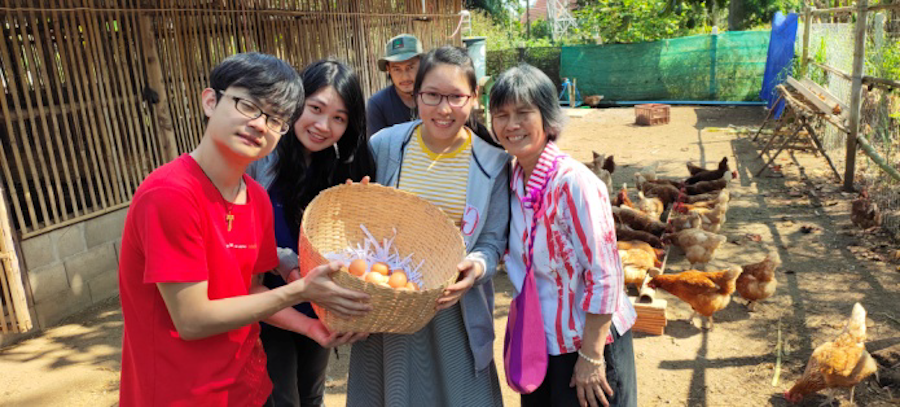
When Emmaus Farm started in 2016, its intent was to help former inmates successfully reintegrate into society. Today the farm has expanded to become a place where people, not just ex-prisoners, can encounter and recognise “God with us”.
A lay woman, Vilaiwan “Kep” Phokthavi, heads the project located in Mae Tang district in Chiang Mai, northern Thailand with a small team of four. The members all belong to the Thai-Karen indigenous community.
“At the heart of Emmaus Farm is a lay intentional community who try to live by the values of Laudato si’,” says Kep, adding that they seek the will of God through spiritual discernment, both personal and communal.
Kep has worked with the Jesuits for many years and is the Director of the Jesuit Prison Ministry in Thailand. She and her team identify prisoners who can benefit from living and working at Emmaus Farm to support their transition after their release from prison, at the completion of their sentence, or as part of their parole.
“From our experience, many prisoners want to be rich. The promise of fast money with little effort makes drug trafficking a tempting alternative for them, but soon they become trapped in the drug trade. At Emmaus Farm, we want to demonstrate the richness of simple living as a farmer,” she says.
Emmaus Farm supports ex-prisoners in the form of agriculture training and personal development, which are extended to families of prisoners of Thai tribal ethnicity. Besides this, the farm also conducts outreach activities, such as collecting used clothes for distribution to orphanages, Karen refugees living in camps on the Thai border, and the families of prisoners. Through local church networks, they have provided high quality eggs and vegetables to local families in need of food.
All this is part of Emmaus Farm’s thrust to “Walk with the Excluded”, one of the four Universal Apostolic Preferences (UAPs) to guide the mission of the Society of Jesus in the next 10 years. The other three being “Showing the Way to God through the Spiritual Exercises and Discernment”, “Caring for our Common Home”, and “Journeying with the youth”.

Kep says they look to the UAPs for inspiration and guidance. The community makes regular use of spiritual conversations and discernment to guide decisions on their programmes and activities. They also welcome people who are interested in finding God through short-stay participation in the life of the community. Among the interested groups are young people.
“For urban youth, this experience may be the first time they have an opportunity to understand the life of a farmer and the importance of caring for our common home, the earth,” says Kep. To date around 150 young people have visited the farm, and their feedback have all been positive.
“I can see how your lifestyle is so comfortable with nature. This is the ideal life for me. How incredible is God’s creation,” shared Violeta Wan-ting, a Magis youth participant from Taiwan.
“Sometimes it was joyful, sometimes it was tough during the immersion,” expressed Vivian from Korea. She admitted that planting bananas almost made her cry, but the support of the community touched her deeply. “I cannot forget such meaningful moments,” she said. “Thank you for teaching me how to live with a lot of joy.”
The relationship between the community and the land is inspired and informed by Laudato si’. Thus, their approach to land use planning and agriculture aims to reflect best practices in sustainable, diversified agriculture using organic agriculture techniques where possible.
“An approach to holistic farm planning has been developed that can respond flexibly to the needs of those who visit, work, and live at Emmaus Farm,” says Kep. “The land, which is approximately three hectares, is already benefitting from greatly reduced use of chemicals.”
Emmaus Farm offers visitors an increased awareness of environmental issues and a deeper understanding of how all of creation is connected. For instance, a first-hand experience of the difficulties involved in digging and planting makes one value the hard work of farmers and have a better appreciation of how food is grown. Every Thursday, the community collects rubbish around the farm, segregating items that can be recycled, re-used, or turned into compost and organic fertilisers. At the same time, they build awareness in the local community on proper waste management.
“Visitors feel grateful for God’s creation and all that we need to live: good air, water, food, shelter, medicine, friendship, and love,” says Kep.
She and her team consider their work a share in God’s work of creation. Whatever the land yields, they share with those in need. As a result, Emmaus Farm is slowly becoming known to neighbouring villages. They have regular discussions with like-minded groups and individuals on developing and promoting practices in sustainable agriculture, water management, and renewable energy.
“When God’s gifts combine with human goodwill and labour, we create wonderful experiences and things that bring us happiness,” says Kep. “The work of our hands we give to God who blesses our work so we can bless others.”

